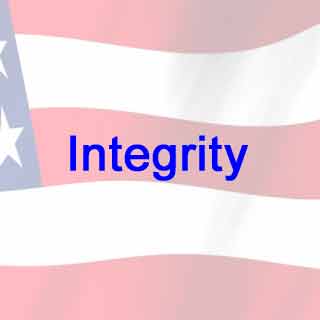Every builder knows that the taller the structure, the more solid and strong the foundation must be. The structure of our lives and communities requires a similarly strong foundation. There is a view of Integrity that can be that strong foundation.
Integrity: the state of being whole and complete
Integrity: the state of being whole and complete. A missing spoke in a bicycle wheel; a hole in a car tire; a damaged support pillar in a skyscraper – all degrade the integrity and functionality of the object.
Human integrity is no different. Human integrity is present only to the extent that “whole and complete” is in some sense present. However, there are no engineering specs for human integrity. Like every human endeavor, perfection, perfect integrity, is an unattainable goal.
When I was much younger, there was a popular saying: “Get Real”
The foundation of personal integrity is to seek out and acknowledge “What’s So” in the world, the “what happened”. Integrity requires an unwavering commitment to awareness of reality as it is, as wholly and completely as you are capable of distinguishing it. All without regard to what supports what you want, and untainted by what you make it all mean. Integrity: the state of being whole and complete.
The value of “The truth, the whole truth and nothing but the truth” is not limited to the courtroom. Personal integrity demands that you seek it out.
12-step programs emphasize the importance of this – ‘Denial isn’t just a river in Egypt’. There is little functional difference between ignorance and being in denial. Failure to acknowledge a relevant aspect of reality stops you from moving toward making more effective choices and the better life / better community that would result.
Seeing what is, looking for what you are not noticing and making a practice of noticing when you resist acknowledging what is – these move you toward stronger personal integrity.
Develop the habit of asking yourself “What constitutes whole and complete in this circumstance?”
When you are listening: What am I being told? What am I not being told? Is the meaning I’m hearing what the speaker is trying to convey?
In decision making: Am I really aware of all the pros and cons? What facts am I not considering / don’t want to acknowledge? What best serves family and community as a whole?
In work: What does a complete job really look like? What impacts the long term value to the client? Are there simple things I can do for the client to increase value or avoid potential problems in the future?
Integrity is a direction to move toward. To think you have perfect integrity is to be in denial. It is the nature of human integrity to be going out – when (not If) it does, act to restore it. Ultimately, integrity is a context for living.
Acting with integrity is doing what you know there is to do, and saying what you know there is to say, as wholly and completely as you know how, often – or especially – in the absence of any explicit agreement to do so. This means dealing with issues straight up, openly, without attempting to manipulate events or information.
This often means letting go of the reasons and justifications you fabricate as excuses for doing less than whole and complete.
I’ll say it again: Develop the habit of asking yourself “What constitutes whole and complete in this circumstance?” Integrity: the state of being whole and complete.
Action vs Inaction
There is no moral distinction between choosing to do something that causes harm, and choosing to do nothing or remain silent when you see someone’s choices causing harm.
Most of the time, the challenge seems to be giving up the reasons and justifications we fabricate for inaction. This has been my personal failure, or I would have been writing in earnest years ago. Where do you sit on this spectrum?
Acting with integrity is doing what you know there is to do, and saying what you know there is to say, as wholly and completely as you know how, often – or especially – in the absence of any explicit agreement to do so.
True justice exists only in the absence of original harm; after the fact only retribution and restitution are possible.
